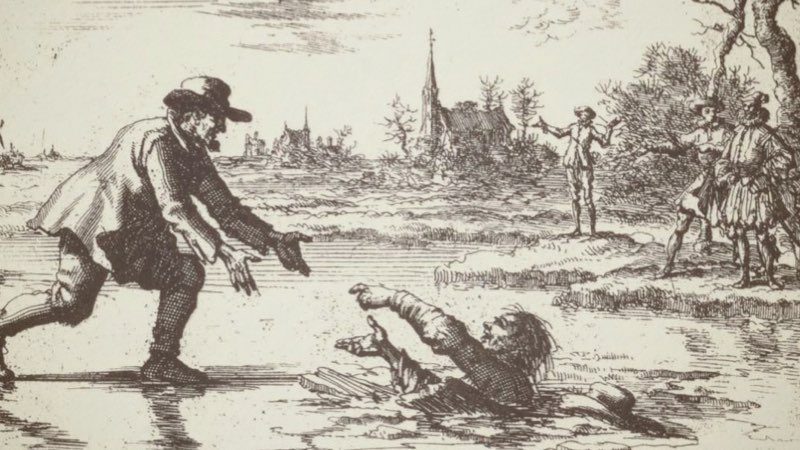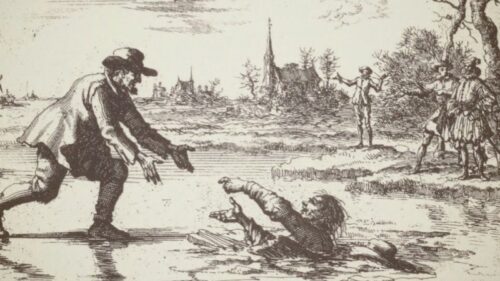
80. Epipodius And Alexander
Epipodius Of Lyons, And Alexander, The Greek, Martyred For The Testimony Of The Evangelical Truth, At Lyons In France; The One Beheaded, And The Other Crucified, About The Year 179
In the seventeenth year of the Emperor Marcus Aurelius, there were slain, among other pious martyrs at Lyons in France, Epipodius, a citizen of Lyons, and Alexander, a Greek by birth; whose imprisonment, suffering, and death occurred in this wise: When the heathen thought that the Christian name was entirely extirpated at Lyons and Vienne, and that no person who confessed it was remaining, these two, as the remainder of the Christians there, were betrayed, accused, and, three days afterwards, placed before the tribunal of the Governor. There they were interrogated in regard to their name and confession of faith, to which questions they candidly replied. Their answers enraged the judge beyond measure, and he commanded that Epipodius, who was the principal speaker, should be smitten on the cheek, which was done in such a manner that he bled from his nose and mouth. But this made this champion of Christ, though he was still young, only the bolder and firmer, and he said: “I confess that Christ, with the Father and the Holy Ghost, is the only true God; and I deem it right, that I should pour out my soul (that is, my life) for Him who is my Creator and Redeemer; for thus, my life will not be taken from me, but changed into a better one. Besides, it matters but little, how and in what manner this weak body is released and separated from the soul, only so that the soul be returned to God, its Creator.”
When Epipodius had, in steadfastness, finished this confession, he was suspended, at the command of the judge, on a stake, on both sides of which the executioners stood, drawing deep gashes with cutting hooks or claws into his sides. In the meantime the raging multitude cried, that he should be stoned to death, or torn limb from limb; for the Judge was much too slow in pronouncing his sentence of death. Then the Judge had him brought out with great haste, and beheaded, and thus this pious witness of the Son of God attained to a blessed end.
Alexander, the above mentioned Greek, was brought out of prison, two days after the death of his beloved brother Epipodius, and placed before the tribunal, where he defended himself most cheerfully, manifesting, at the same time, his great desire to be counted among the number of his slain brethren and sisters. The Judge immediately commanded that Alexander should be stripped, and beaten by three executioners, with sticks, cudgels, etc.; but in all these torments he steadfastly called upon God for help and succor. In short, the sentence of death was pronounced upon him, namely, that he should die on the cross. The executioners then tied him on the cross; but having previously been wounded, by many stripes, to such a degree that his bones or bare ribs were visible, as well as the vital parts of his viscera, namely, the lungs, the liver, the heart, etc., which could be observed moving, he gave up the ghost, before the executioners could inflict further tortures upon him; and thus, in steadfastness he died a blessed death. When this had taken place, he was buried with his friend Epipodius, who had been beheaded, on the 24th of April 179.
Abr. Mell, 1st book, fol. 48, col. 1-4. ex act. Proconsular. Homil. Eucherii Episc. Lugd. sub nomine Eus., Emisseni de Blandina and aliis Ado Vienn., Mart. 22 April.
Thieleman J. Van Braght (1625-1664) was an Anabaptist who is best known for writing a history of the Christian witness throughout the centuries entitled “The Bloody Theater or Martyrs Mirror of the Defenseless Christians who baptized only upon confession of faith, and who suffered and died for the testimony of Jesus, their Saviour, from the time of Christ to the year A.D. 1660” (1660).
Thieleman J. Van Braght, Martyrs Mirror




